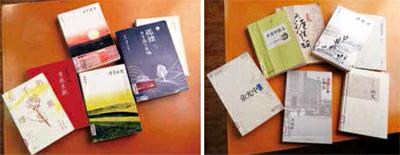余光中留在西湖的诗韵
2018-02-05郭之鲲
郭之鲲
“西湖的美是永恒的”
余光中先生和杭州渊源颇深。他对西湖情有独钟,多次来到杭州,还跟妻子一起来“寻根”。2011年春,他在杭州接受了浙江大学传媒与国际文化学院客座教授的聘书,从此成为了一位“浙大人”。
次年金秋,他在夫人的陪同下来杭州,参加了2012西湖国际诗会。诗友们在运河边一起庆祝他85岁生日。余光中现场朗诵起他的《断桥残雪》——
“黑底相衬匾书的金字,正是‘云水光中,十景起点,湖光向西南开展,就算桥真的断了,多少故事与柳线争长,怎能就了断,一阵风来,皱了西子的妆镜。”
这首诗歌,是余光中写给西湖的。他是地道的杭州女婿,岳父是浙江大学教授范赉,曾在园艺系做主任。夫人范我存,杭州刀茅巷出生,在杭州生活到6岁。范我存小名咪咪,是余光中的远房表妹,两人2016年庆祝了钻石婚。
5年前,和夫人范我存一起回杭州寻根时,余光中曾说:“6岁的时候,父亲第一次带我出门旅游,就来到了杭州西湖。我夫人也是在6岁那年爬的北高峰。”在余光中眼里,每一次来杭州游西湖,永远跟6岁第一次见到时那样美。“西湖的美是永恒的,无论苏东坡之前,还是之后。它一直都是如此美丽动人,吸引着中外游客来膜拜这位女神。”
浙江文艺出版社出版的《凡·高的向日葵——余光中散文》一书,其中有余光中写2011年杭州行的一篇《西湖怀古》。那年他去浙大紫金港校区的国际会议中心演讲,一开场就说“我一结婚就跟浙江大学发生了关系”,把台下浙大学生逗得哄堂大笑。余光中解释,“我去杭州,另有一个动机,就是成全吾妻的寻根之旅……更高兴的是浙大事先已搜集到有关我岳父的资料,也在那场合一并相赠。”
金陵子弟江湖客。余光中先生一生漂泊,他祖籍是福建泉州永春,1928年重九日生于南京。9岁因战乱逃离故乡,母亲把幼小的余光中放进箩筐用扁担挑在肩上,一路逃到常州,后又避难于重庆。抗战胜利后返回南京,又到上海、厦门,再从大陆到香港然后到台湾,之后求学于美国,任教于香港,在台北居住多年,最终落脚于台湾高雄西子湾畔。正是频繁的奔波迁徙、聚散离合,使他写下了著名的《乡愁》。
杭州诗人舒羽和余光中算是“忘年交”。舒羽后来发现,她小时候的音乐启蒙老师、古琴名家高醒华,正是余光中就读金陵大学时的老同学。余光中在《西子湖到西子湾》一文中曾说:“我下次再去杭州,醒华当为我抚琴。”2012年的重阳节,余光中实现了这个心愿。在杭州的生日宴上,高醒华用古琴弹了一曲《良宵引》,舒羽用古筝演奏了一曲《高山流水》,而余光中則用古调吟唱了苏轼的名篇《念奴娇·赤壁怀古》。
舒羽在一篇文中写道:“2012年2月,我开车载余先生和范我存师母,先领略了千岛湖的浩渺湖景。第二天在桐庐,细雨中上桐君山,去芦茨湾,游严子陵钓台……接着我们去了绍兴,下榻大禹陵旁的度假村。在沈园的陆放翁老学庵里,他认认真真地捧一本书,做‘活到老学到老的样子,留了一张影。”另外一次是舒羽陪余光中去湖州。在浙江,余光中还去过温州和雁荡山,但来得最多的还是杭州。”
舒羽说:“他为西湖特地写了《断桥残雪》,也为大运河写过《拱宸桥诗会》。一代大诗人的两首与杭州有关的诗,我都是第一个读者,我现在想起来还是倍感欣慰的。”
遨游在写作的四维空间
然而很多人可能并不知道,除了《乡愁》,余光中的诗歌还有长诗、叙事诗。除了诗歌,还写有许多优美隽永的散文。早在1996年,余光中就与浙江文艺结缘。当时余光中还在高雄中山大学当教授。在过去的20年里,浙江文艺出版社推出了《余光中散文》四个版本,历经出版社三任编辑。
余光中的散文色彩与清淡兼存,往往在色彩中见感性、清淡中见韵味,造就一种高远不凡的诗境。
梁实秋曾称赞他“右手写诗,左手写散文,成就之高,一时无两”。
余光中的诗文如《乡愁》《翠玉白菜》《我的四个假想敌》《听听那冷雨》《车过枋寮》等多篇名作收入教科书。他的多件作品被杨弦、李泰祥、罗大佑等人谱成歌曲传唱。
余光中一生从事诗歌、散文和评论、翻译工作,自称为遨游在写作的四维空间。除了《乡愁》,他还有那么多优美的诗歌和散文,还有《梵谷传》(《梵高传》)、《土耳其现代诗选》和王尔德的《不可儿戏》、海明威的《老人与海》等精彩的翻译作品。
永远的乡愁,永远的余光中
半个世纪过去了,为什么我们还会被那首《乡愁》深深打动?很多人对余光中诗作《乡愁》的巨大影响和穿透力觉得不可思议,以致有这么一个说法:凡是有华人脚印的地方,就会响起《乡愁》的吟诵声。这是一个非常奇特的文坛现象。
其实余光中后来并不太乐意在公众场合吟诵这首诗。事后他说,希望大家看看他其他主题的诗,而不仅仅是《乡愁》。他自己就经常说,这首诗他不过花20多分钟就写出来了。但也许就是因为这首诗的盛名遮蔽了他真正的佳作光辉。《乡愁四韵》《登长城》《访故宫》《三生石》《嘉陵江水》等比《乡愁》有更高艺术水准的诗不在少数。
那首以《乡愁四韵》作歌词谱成的感人至深的曲子,“给我一瓢长江水啊长江水,酒一样的长江水,醉酒的滋味,是乡愁的滋味,给我一瓢长江水啊长江水……”至今还在我的耳畔回响!
但无论哪一首,至今都没有超过《乡愁》的影响力。为什么人们最爱的还是《乡愁》,而不是余光中的其他代表作?这首《乡愁》浅显易懂、琅琅上口,已成为一种家国情怀的典型表达方式。许多人从这首诗中,找到了属于自己的乡愁。可以说,余光中写出了一代人,甚至所有中国人对两岸统一的期盼。
余光中说,“地理的乡愁要乘以时间的沧桑,才有深度,两岸开放交流以来,地理的乡愁固然可解,但文化的乡愁依然存在……”endprint

追根溯源,這背后的一个深刻原因,是余光中所有诗文的最终指向,是我们共同拥有的中华民族强大的文化传统,是那种让全球华人魂牵梦绕的永恒的归属感和家园感。余光中的诗文总是浓缩着那么强烈的怀乡的情感,总能打动亿万华人,勾起全球华人的文化记忆和命运共同感。
余光中的艺术追求不仅浸透了一种文化乡愁,也为汉语融入世界开拓了广阔的前景。
永远的乡愁,永远的余光中!
Poets Ties with Hangzhou
By Guo Zikun
Yu Guangzhong, a renowned Chinese poet based in Taiwan, passed away at the age of 90 on December 14, 2017. The poet had profound ties with Hangzhou and loved the West Lake. He and his wife visited Hangzhou several times in search of the family roots. In the spring 2011, he was also engaged as a guest professor with the Media and International Culture College, Zhejiang University.
In the autumn of 2012, Yu Guangzhou and his wife visited Hangzhou and attended the 2012 West Lake International Poets Convention. Local poets and friends held a party on the Grand Canal of China, which zigzags through the city proper, in celebration of his 85th birthday. Yu recited a poem titled , which is also one of the most famous highlights of the scenic lake.
The poets ties with Hangzhou went much farther back in time. His father-in-law Fan Lai was a professor of Zhejiang University and served as dean of the gardening department. Fan Lais daughter Fan Wocun was born in Hangzhou and didnt leave Hangzhou until she was six years old. Fan Wocun, a distant relative on Yu Guangzhongs mothers side, later married Yu Guangzhong. In 2016 they celebrated the diamond anniversary of their marriage.
Yu Guangzhong talked about his ties with Hangzhou during his visit in October 2012. “My father and I took my first travel together when I was six years old. We visited the West Lake, Hangzhou. My wife got to the North High Peak on the “West Lake when she was six years old. The beauty of the West Lake is eternal no matter whether it was before or after Su Dongpo visited it,” commented the poet. In his eye, the lake was as beautiful as he first saw it at six.
Yu Guangzhong wrote an essay about his 2011 visit to Hangzhou. During this root-seeking tour, he gave a lecture at the international conference center on the Zijin Campus of Zhejiang University. He started the lecture by saying “I had an affair with Zhejiang University as soon as I got married.” He mentioned in the essay that Zhejiang University presented him with a collection of documents about his father-in-law on that occasion.
Shu Yu, a poet in Hangzhou, found she had a tie with Yu Guangzhong. After she grew up and became a poet herself, she found that Gao Xinghua, a music teacher under whose guidance she studied in her childhood years, was a schoolmate of Yu Guangzhong at Jinling University. Yu Guangzhong mentioned in an essay that Xinghua ought to play a piece on Guqing when he would visit Hangzhou in the future. The dream came true in October 2012. Gao Xinghua played a tune on , Shu Yu played a tune on zither, and Yu Guangzhong recited a poem by Su Dongpo in the tradition citation manner.
Shu Yu recalls Yu Guangzhong and his wifes visits to Zhejiang. in February 2012, she drove the couple to visit the 1,000-Isle Lake. On the way back to Hangzhou, they visited Tonglu, a rural county with sites of historical interests. After that she also drove the couple to visit Shaoxing. Shu Yu feels proud that she was the first reader of and , two poems written by Yu Guangzhong about Hangzhou.
A prolific poet and essayist, Yu Guangzhong published 17 poetry collections and 12 prose collections in his lifetime. Some essays and poems are well known to millions. And some are in school textbooks on the mainland. Zhejiang Literature and Art Press has published four editions of over the past 20 plus years. The collections were respectively edited by three different editors. The first one came out in 1996 when Yu was a professor with at National Sun Yat-sen University in Kaohsiung.endprint
